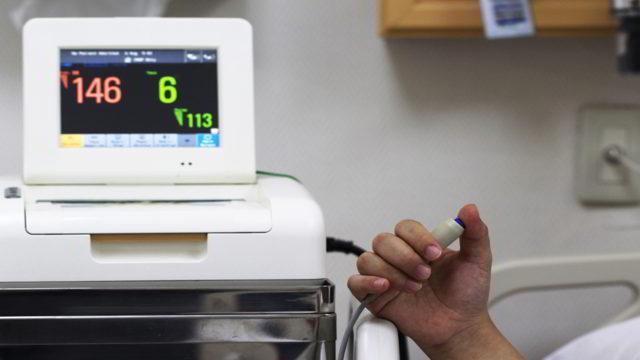Pregnancy Check Up

What is a Pregnancy check-up?
A pregnancy check-up is a medical check-up that you get while you are pregnant. You and your developing baby are examined by your healthcare professional at each appointment. As soon as you discover that you are pregnant, contact your healthcare practitioner and schedule your first prenatal care appointment. Also, even if you’re feeling great, be sure to attend all of your prenatal care appointments.
Everything You Need to Know About Pregnancy Check-Up
Importance | First Trimester Test | Second Trimester Test | Third Trimester Duration | Cost
Importance of Pregnancy Check-ups
In the same way that you saw your health professional on a regular basis throughout your first trimester, you should continue to do so during your second trimester and third trimester. These checks aid in the monitoring of your baby’s growth and wellbeing — as well as your own overall health. The majority of pregnant women see their physicians once a month for prenatal checkups. If you have a previous health problem or are pregnant at high risk, you may need to consult your doctor more frequently.
You will very probably be subjected to blood work, urine testing, and a glucose tolerance test as well (maybe not the most fun test, but certainly important to screen you for gestational diabetes).
Sub Treatments For Pregnancy Care
We are one of the Best IVF Clinic in Delhi NCR!
51.8K
Subscribers
4.6 (383 reviews)
4.5 (409 reviews)
3.5 (254 reviews)

5 Out Of 5
Prenatal Screening Tests during the First Trimester
Prenatal screening during the first trimester includes both fetal ultrasonography and maternal blood tests. This screening procedure may assist in determining the likelihood that the baby will be born with specific birth abnormalities. Screening tests may be used on their own or in conjunction with another testing.
The following tests are performed during the first trimester:
- Ultrasound for fetal nuchal translucency. When a fetal neck is examined for excess fluid or thickness, it is known as nuchal translucency screening. An ultrasound is used to check for this condition.
- Ultrasound for the determination of the fetal nasal bone. Some infants with specific chromosomal abnormalities, such as Down syndrome, may not develop a nasal bone until later in life. An ultrasound is used to conduct this screening between the 11th and 13th weeks of pregnancy to see if nasal bones are visible.
It is advised to seek genetic counseling if the findings of these first-trimester diagnostic tests are abnormal. To make an accurate diagnosis, further tests such as chorionic villus sample, amniocentesis, cell-free fetal DNA, or other ultrasounds may be required.
Prenatal Screening Tests in the Second Trimester
Prenatal screening during the second trimester may involve a number of blood tests known as multiple markers (Triple/Quadruple) They give information about your prospective risk of having a child with specific genetic disorders or birth abnormalities based on your DNA profile. A small amount of blood is typically taken between 15 and 20 weeks of pregnancy as part of the screening process. The various markers are as follows:
- AAFP screening is required. This blood test, which is also known as maternal serum AFP, is used to determine the amount of AFP in your blood during pregnancy. AFP is a protein that is typically generated by the fetal liver and is found in the fluid that surrounds the baby during pregnancy (amniotic fluid). It makes its way through the placenta and into your bloodstream. Because AFP levels fluctuate during pregnancy, abnormal levels may indicate: A miscalculated due date, as the levels fluctuate throughout pregnancy.
The abnormal value of this screening test indicates that the fetus may be born with defects. This might include defects in the abdominal wall or with Down syndrome or other genetic abnormalities like: Open neural tube abnormalities, such as spina bifida, etc. Increased level may also be present in a pair of identical twins (more than one fetus is producing the protein).
- Estriol – The placenta is responsible for the production of this hormone. It may be detected in the blood or urine of the mother and used to assess the health of the fetus.
- Inhibin – The placenta is responsible for the production of this hormone.
- Human chorionic gonadotropin is a hormone that stimulates the production of eggs.
Similarly, the placenta is responsible for the production of this hormone.
Test findings for AFP and other markers that are abnormal may indicate the need for further investigation. An ultrasound is used to confirm your pregnancy’s milestones and to look for abnormalities in the fetal spine and other body components throughout your pregnancy. It may be necessary to do an amniocentesis in order to obtain an accurate diagnosis.
What is the duration of the third trimester?
Maternity is divided into three-month blocks known as the first, second, and third trimesters. The completion of your pregnancy implies that you have entered the third and last trimester of your pregnancy. Despite the fact that this trimester legally continues, the trimester will come to an end as soon as your baby is delivered.
The first, middle and third trimesters of pregnancy are split into three blocks of three months each — the first, second, and third trimesters. When you reach week 27 of your pregnancy, you will have entered the third and last trimester of your pregnancy. It is possible that this trimester may come to a conclusion at week 40, but in fact, it will finish when your baby is delivered.
It is regarded that a baby has been born at full-term if the infant is born between weeks 37 and 42 of pregnancy. A baby delivered before the 37th week of pregnancy is considered preterm, and if your child has still not been born by the 42nd week of pregnancy, labor may be forced.
Cost
The cost of pregnancy checkups vary at different clinics and hospitals and depend upon various factors. The prenatal checkups include different things like medical expenses, doctors’ visit, and sonographies. All these expenses can cost between Rs. 30,000 to 50,000 in India.
The cost of prenatal checkups depend on the factors like the choice of hospital, doctor and prenatal plan. You need to consult the healthcare provider to get a proper understanding of the cost.
Patient Testimonials
It’s always the word of mouth that’s the best advice
Published On: 3 Dec 2018
London to Gunjan IVF: Mrs. Pragya's journey of parenthood |Treated for pregnancy care | Gunjan IVF
Published On: 7 Oct 2018
We are pregnant!! | Pregnancy after Fibroid Removal Treatment (Myomectomy)| Gunjan IVF World

Erica Benn
It was such a nice experience with Dr. Gunjan and how she tackle our case. I must recommend this clinic as one of the best IVF clinic in Delhi-NCR. Thanks to Dr. Gunjan to give me my motherhood.

Nitesh Kumar Thakur
Gunjan IVF World in Indirapuram, Ghaziabad is the best hospital for surrogacy and ivf services in Delhi-NCR. Dr. Gunjan Gupta is founder and director of Gunjan IVF World. Gunjan IVF is the best ivf center in Indirapuram , Ghaziabad. Treatments at affordable prices.

Akansh Garg
Dr gunjan gupta is one of best gyne in delhi ncr especially in ghaziabad she explains each n everything very clearly to avoid any confusion. staff is very supportive n helpful.

Manisha Pathak
Went for treatment at various places in Delhi since 2012. Then came to know about Gunjan IVF. Started treatment in October 2020. The treatment is going on and we are quite hopeful. Gunjan ma'am is a very good doctor who treated me well and the staff are also very good and helpful.

Erica Benn
It was such a nice experience with Dr. Gunjan and how she tackle our case. I must recommend this clinic as one of the best IVF clinic in Delhi-NCR. Thanks to Dr. Gunjan to give me my motherhood.

Nitesh Kumar Thakur
Gunjan IVF World in Indirapuram, Ghaziabad is the best hospital for surrogacy and ivf services in Delhi-NCR. Dr. Gunjan Gupta is founder and director of Gunjan IVF World. Gunjan IVF is the best ivf center in Indirapuram , Ghaziabad. Treatments at affordable prices.

Akansh Garg
Dr gunjan gupta is one of best gyne in delhi ncr especially in ghaziabad she explains each n everything very clearly to avoid any confusion. staff is very supportive n helpful.

Manisha Pathak
Went for treatment at various places in Delhi since 2012. Then came to know about Gunjan IVF. Started treatment in October 2020. The treatment is going on and we are quite hopeful. Gunjan ma'am is a very good doctor who treated me well and the staff are also very good and helpful.
Patient Guide
Along with treating our patients, we also guide them with the help of our educational blogs and videos.
Educational Blogs

Why do blastocyst not implant?
The reasons for an unsuccessful implantation are very uncommon and rare as well. Blastocyst provides a greater chance of becoming pregnant therefore the procedure is handled properly as well.

What happens after blastocyst transfer?
Before jumping to the immediate question first let’s have a small brief of what is blastocyst transfer. Blastocyst transfer is the transfer of embryos that have achieved a higher stage of development.

Can blastocyst fall out?
Maximum patients worry about what they can do or cannot do after an embryo transfer. They have the fear that if they do something wrong, the embryo would not attach or fall out.
Educational Videos

What is TORCH test in infertility and why is it done?
There are numerous tests that are available to infertile couples that are recommended by some doctors, which might help them determine the cause of their infertility. One such test is the TORCH test.

What is Prolactin Hormone?
Prolactin is a hormone produced by the pituitary gland present at the brain’s base. It is best known for its role in lactation, or milk production, in breastfeeding women.However, Prolactin also plays other important roles in both men and women, such as regulating the immune system, stimulating the growth of new blood vessels, and influencing behaviour and reproductive function. In this blog, we will explore what Prolactin is, how it works, and what happens when there are imbalances in prolactin levels.

Frequently Asked Questions about Low AMH
Primordial and Preantral follicles produce AMH. So the AMH level indicates the number of eggs or egg reserves you have in your ovary. Putting simply, if your AMH level is low, then the number of eggs in your ovary is less.
Frequently Asked Questions
Can obesity or being overweight have an impact on a man’s fertility?
Comprehensive Fertility Treatments | Gynaecology Procedures | Menopause Management | Pregnancy Care | Maternity & Birthing Call +91-9990044555A short article by IVF experts...
Does testicular temperature have an impact on male fertility
IVF specialists of the best IVF centre in Ghaziabad – Gunjan IVF World share an informative blog on one of the most ignored factors of male infertility. It is an alarming fact to...
Is male menopause a myth or reality ?
IVF specialists of the best IVF centre in Ghaziabad – Gunjan IVF World debunk the myths about male menopause through this informative blog Menopause as a term is extremely common...















